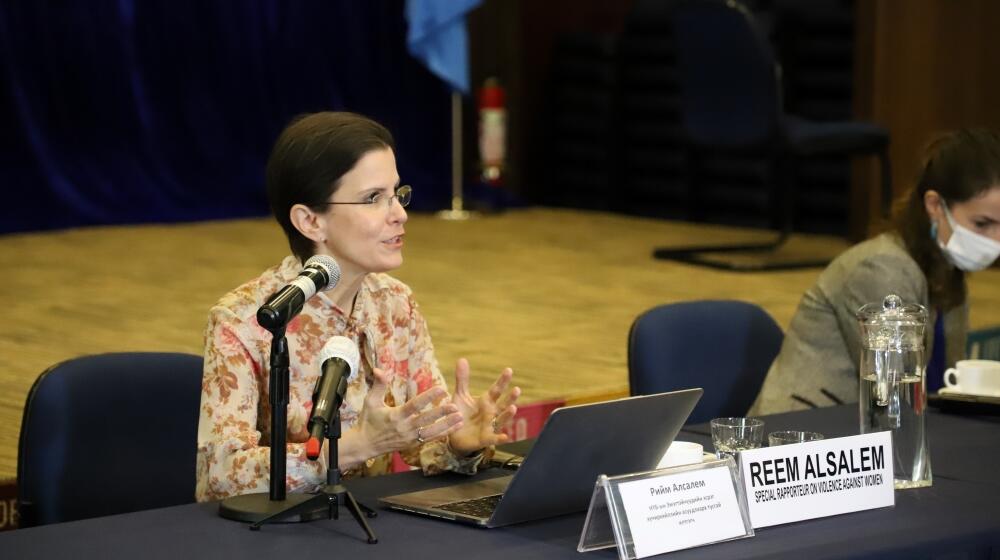ULAANBAATAR (8 December 2021) – A UN human rights expert today commended Mongolia’s significant progress in passing legislation to combat gender-based violence against women, saying the challenge now was to ensure effective implementation of the laws throughout the country.
In the past 10 years, key pieces of legislation on domestic violence, trafficking in people, gender equality, and witness and victim protection, among others, have set a legal framework to tackle gender-based violence, said the Special Rapporteur on violence against women, Reem Alsalem, in a statement at the end of an official visit to the country.
“They offer a solid basis for continuing with legal reform, including that needed to align national legislation with international standards,” she said.
“It is welcome that services for victims, like shelters, one-stop service centres and multidisciplinary teams, have been progressively expanded, including at provincial level. More needs to be done however to ensure their availability and viability, particularly for women in remote or rural areas.”
There is also a need to promote a gender-sensitive approach by these services, especially those designed to target women victims of domestic violence, Alsalem said. Currently, service providers, particularly State-run, place actions related to women victims of violence under the broader heading of family-related interventions or combine them with actions aimed at preventing violence against children.
The expert also called on the Government to widen the scope of its policies and services to explicitly identify, include and reach vulnerable groups who are particularly exposed to gender-based violence such as victims of trafficking, members of the LGBTI community and sex workers.
“Service providers, law enforcement and the justice system need to respond to the needs of all groups of women and girls, and to all types of violence they experience, not only domestic violence,” Alsalem added.
To be truly effective, prevention activities need to tackle the deep-seated harmful gender stereotypes that exist in Mongolian society and that normalise violence against women and blame victims.
“Bold, courageous campaigns, as well as human rights education, are necessary, including to address alcoholism, a triggering factor in many cases of violence,” the expert said.
During her 10-day mission, Alsalem met Government officials, members of Parliament, the Supreme Court, independent state institutions, international organizations, donors, financial institutions, civil society organizations and victims.
The Special Rapporteur will present her findings to the Human Rights Council in June 2022.
ENDS
Ms Reem Alsalem (Jordan) was appointed as Special Rapporteur on violence against women, its causes and consequences by the UN Human Rights Council in July 2021, to recommend measures, ways and means, at the national, regional and international levels, to eliminate violence against women and its causes, and to remedy its consequences. She holds a Masters in International Relations from the American University in Cairo, Egypt (2001) and a Masters in Human Rights Law from the University of Oxford, United Kingdom of Great Britain and Northern Ireland (2003). She is an independent consultant on gender issues, the rights of refugees and migrants, transitional justice and humanitarian response.
The Special Rapporteurs are part of what is known as the Special Procedures of the Human Rights Council. Special Procedures, the largest body of independent experts in the UN Human Rights system, is the general name of the Council's independent fact-finding and monitoring mechanisms that address either specific country situations or thematic issues in all parts of the world. Special Procedures experts work on a voluntary basis; they are not UN staff and do not receive a salary for their work. They are independent from any government or organisation and serve in their individual capacity.
UN Human Rights, country page: Mongolia
For more information and media requests, please contact:
Ms. Renata Preturlan (+41 22 928 9254 / renata.preturlan@un.org)
For media inquiries related to other UN independent experts please contact:
Mr. Jeremy Laurence (+41 22 917 9383 / jlaurence@ohchr.org)
Follow news related to the UN’s independent human rights experts on Twitter @UN_SPExperts.
Concerned about the world we live in?
Then STAND UP for someone’s rights today.
#Standup4humanrights and visit the web page at
http://www.
__________________


